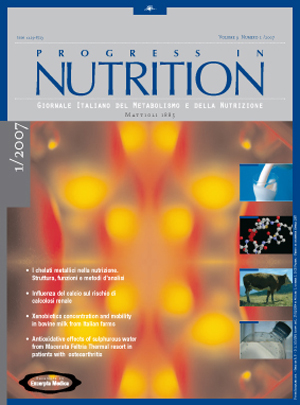Effects of dietary w-3 fatty acids content on productive performances and meat quality of Martina Franca donkey foals
Keywords:
PUFA, w3, donkey, meat qualityAbstract
To investigate the effect of diets containing fatty acids of the w-3 series on productive traits, on carcass cut composition, on meat chemical composition as well as on meat fatty acid composition, eight Martina Franca donkey foals were utilized. The animals, weaned at 8 months of age, were divided into two groups of 4 subjects each, homogeneous for age and live weight. The first group (control) was given wheat straw and a complete feed non supplemented with w-3; the second (trial) was given wheat straw and a w-3 supplemented complete feed. All the animals were slaughtered after 138 days of trial. From the collected data, it emerges that the utilization of w-3 enriched feed, even though with different levels of statistical significance (P ² 0.05 and/or P ² 0.01), determines differences in the content of fat, meat and bone of shoulder and loin and in the meat ashes percent. As regards the meat fatty acids distribution, no remarkable differences are observed as to the saturated series, whereas the unsaturated one (P² 0.05) seems to increase the content of C18:3w3 (ALA - a-linoleic), of C22:5w3 (DPA – docosapentenoic acid), of C22:6w3 (DHA – docosahesanoic acid) and of UFA, PUFA and total w-3 acids.Downloads
Issue
Section
License
This is an Open Access article distributed under the terms of the Creative Commons Attribution License (https://creativecommons.org/licenses/by-nc/4.0) which permits unrestricted use, distribution, and reproduction in any medium, provided the original work is properly cited.
Transfer of Copyright and Permission to Reproduce Parts of Published Papers.
Authors retain the copyright for their published work. No formal permission will be required to reproduce parts (tables or illustrations) of published papers, provided the source is quoted appropriately and reproduction has no commercial intent. Reproductions with commercial intent will require written permission and payment of royalties.

This work is licensed under a Creative Commons Attribution-NonCommercial 4.0 International License.


